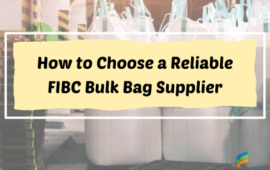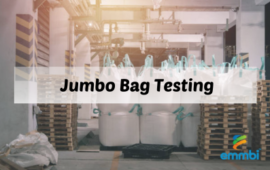FIBC (Flexible Intermediate Bulk Container) bags, also known as jumbo bulk bags, are polypropylene based highly capable storage containers. They are used across industries for carrying various substances, including hazardous and flammable materials. They come in multiple shapes, sizes, and types, making them a game-changer in transportation and storage.
However, FIBC jumbo bags require special handling and safety measures to prevent mishaps, especially in Type B, Type C, and Type D bags used for flammable powdered chemicals and other susceptible goods.
Following are five safety tips for using FIBC jumbo bags:
- Use All Four Loops
FIBC super sacks usually come with four loops for handling, and they are engineered for lifting and suspension using all four lift loops. Using fewer than four loops could cause damage to the bag, which can also result in damage to the products stored within.
- Keep Lifting Loops Vertical
Lifting straps, though quite strong, are externally attached, which makes them vulnerable to lateral pressure. To minimise strain, keep the lift loops as nearly vertical as possible, and ensure that the lifting hooks or outside edges of forklift blades are not apart from the lift loops.
- Protect Lift Loops
Before filling a bulk bag or attaching it to a forklift, the forklift’s tines must be inspected for sharp edges or burrs. You guard against damaging the lift loops or sleeves by rounding the edge or padding the forks; check top tines.
- Avoid High Temperatures
Jumbo bulk bags are highly capable of resisting extreme climatic conditions.
Bulk bags are designed to resist and fight the effects of UV light on their performance. The polypropylene material used for manufacturing FIBCs is highly susceptible to UV A & UV B radiations in sunlight, causing degradation.
For making the jumbo bulk bags suitable for long-term outdoor use, Emmbi
Applies the UV treatment where a special masterbatch is added while processing the polypropylene. Several other stabilisers also help improve the bags’ light and colour properties. This ensures that the bags have a UV percentage per the Global UV index which differs for every country.
However, prolonged exposure to sunlight will weaken the fabric and all other components. Therefore, bags must be covered at all times if they are to be stored outdoors for an extended period.
- Avoid Jerking Motion
When the bags are suspended mid-air during fork lifting, it is essential to avoid any jerking motions. Such motions create undue stress and pressure on the lifting loops, resulting in damages and breakdowns, causing economic losses and mishaps.
- Prevent Dragging of FIBC/Jumbo Bag/Big Bag
While transporting bulk bags, it is essential to ensure that they are not being dragged on the floor. This is even more important when using a forklift for transferring the bags, as pressurised dragging of bulk bags can damage the bottom, leading to loss of the product stored inside.
- Avoid Contact with Sharp Objects
One of the most common reasons for bulk bags getting damaged is their contact with sharp objects. Therefore, it is crucial to inspect the walls and floors where the bulk bags are stored to avoid tearing and ripping due to sharp or abrasive objects.
- Use Slings to Lift Fallen Containers
Another common reason for bulk bag damage is mishandling while lifting a fallen bag. Since these bags are filled with heavy materials, it requires a forklift to lift them. Loop a place of rope or webbing through all four lift loops, then secure each end to a forklift tine and gently lift.
Emmbi is the leading fibc jumbo bag manufacturer offering affordable bulk bags that can be heavily customised as per client requirements.
Contact us today to solve all your product packaging needs.



